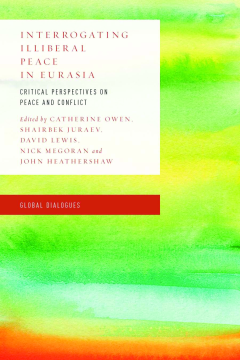
BOOK
Interrogating Illiberal Peace in Eurasia
Catherine Owen | Shairbek Juraev | David Lewis | Nick Megoran | John Heathershaw
(2018)
Additional Information
Book Details
Abstract
The collapse of the USSR wrought dramatic changes in Eurasia, both in terms of the structure of state power within the region, and the ways in which Western states and international organisations engaged with it. Analyses of conflict in this region remain rooted in supposed ‘global models’, often assuming that patterns of state failure are due to resistance to the liberal model of peacebuilding.
This book sets out a challenge to these assumptions and framings. It not only questions but resolutely dismisses the notion that the peacebuilding methods favoured by Western states remain the most salient in Eurasia. Instead, it develops a framework that seeks to conceptualise the ways in which non-liberal actors contest or transform globally promoted norms of conflict management and promote alternative ones in their place. Authoritarian Conflict Management (ACM) consists of an ensemble of norms and practices in which non-liberal actors attempt to exert sustained hegemonic control over the local discursive, economic and spatial realms in a given territory.
With case studies ranging from Afghanistan to Uzbekistan, Xinjiang to the Caucasus, the chapters shed light on the ways in which local and regional actors enact practice of ACM in order to impose stability in conflict-prone localities, thereby challenging the Western-led consensus known as the ‘liberal peace’.
Grounded in rich empirical investigations, this collection analyses the new forms of authoritarian conflict management emerging in contemporary Eurasia. It is a welcome contribution to the growing and important scholarship that no longer takes the ‘liberal peace’ as its sole point of reference, but seeks to understand non-liberal forms of peace and conflict management, as well as challenges to these, in their own terms.
Shahar Hameiri, University of Queensland
Catherine Owen is British Academy Postdoctoral Fellow at the University of Exeter.
Shairbek Juraev is Marie Curie Fellow, School of IR, University of St Andrews.
David Lewis is Senior Lecturer, Director of Education, Department of Politics, University of Exeter.
Nick Megoran is Reader in Political Geography, Newcastle University.
John Heathershaw is Associate Professor in International Relations, University of Exeter.
Table of Contents
| Section Title | Page | Action | Price |
|---|---|---|---|
| Interrogating Illiberal Peace in Eurasia | Cover | ||
| Contents | v | ||
| Illiberal Peace and Authoritarian Conflict Management: Empirical and Theoretical Contexts | 1 | ||
| 1 History, Memory and the Quest for Conflict Resolution in Southern Kyrgyzstan and the Ferghana Valley | 25 | ||
| 2 China’s Approach to Countering Religious Extremism among Uyghurs in Xinjiang | 55 | ||
| 3 Women and Literature in Azerbaijan: Creative Literacy as an Asset Model of Peace-Building | 73 | ||
| 4 A Negative Post-Liberal Peace? Inquiring the Embeddedness of Everyday Forms of Peace in Central Asia | 97 | ||
| 5 ‘Everyday Peace’ in Jabbor Rasulov, Tajikistan: Local Social Order and Possibilities for a Local Turn in Peace-Building | 121 | ||
| 6 Nation-Building in Central Asia: Towards a New Ethnic Policy | 145 | ||
| 7 Clashes of Universalisms: Xinjiang, Tianxia and Changing World Order in the Nineteenth Century | 173 | ||
| 8 Spatial Security during Ethnic Riots in Osh: How Spatial Factors and the Built Environment Affect the Local Dynamics of Violence and Neighbourhood Security | 195 | ||
| 9 Bottom-Up Peacekeeping in Southern Kyrgyzstan: How Local Actors Managed to Prevent the Spread of Violence from Osh/Jalal-Abad to Aravan, June 2010 | 223 | ||
| 10 Conflict Management, Extractive Industries and the 2014 International Military Exit Strategy in Afghanistan | 249 | ||
| 11 Positive Incentives to Stop Insurgency? Russian Conciliatory Tactics in the North Caucasus | 271 | ||
| Index | 307 | ||
| About the Contributors | 313 |
